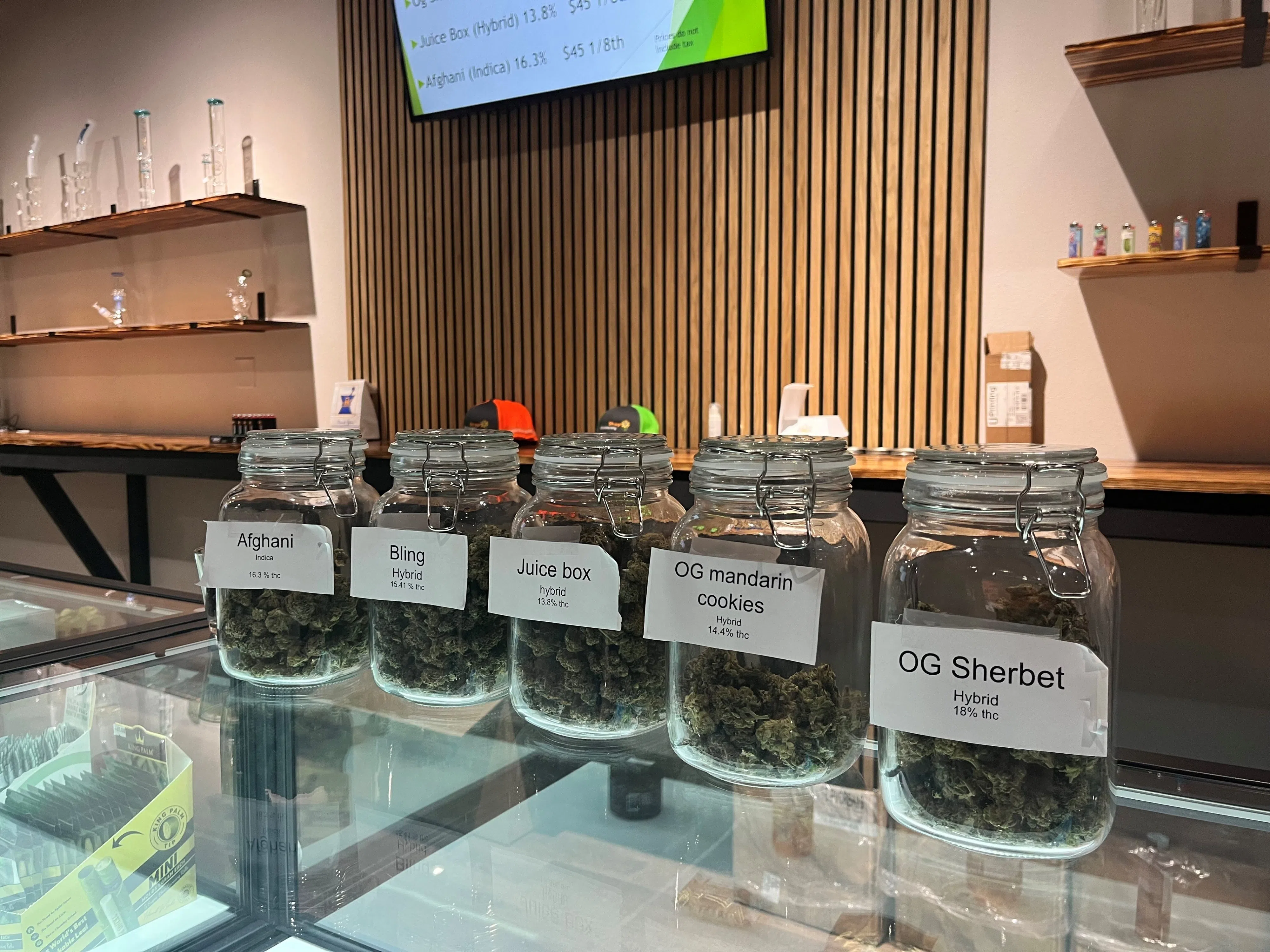
BY STU WHITNEY
PIERRE, S.D. (South Dakota News Watch) – Most South Dakotans oppose the latest attempt to legalize recreational marijuana in the state, according to a scientific poll of 500 registered voters co-sponsored by South Dakota News Watch.
The statewide survey, also sponsored by the Chiesman Center for Democracy at the University of South Dakota, showed that 52% of respondents are against Initiated Measure 29, compared to 42% who support it and 7% who are undecided.
The rate of opposition is consistent with a similar measure’s defeat in the 2022 election, when South Dakotans voted against legalizing recreational marijuana by a margin of 52% to 47%.
But the level of support has dropped, according to the poll, creating a sizable deficit at a critical time when ballot measure committees are raising money and building strategies for the November 2024 election.
“We believe that the level of support among voters for Measure 29 is higher than the figure in this latest poll,” said Matthew Schweich, executive director of South Dakotans for Better Marijuana Laws, whose group spearheaded the petition effort.
Schweich points to the last presidential election in 2020, when pro-legalization Amendment A passed with 54% of the vote, clearing the way for recreational marijuana to be implemented in the state. Medicinal pot was also approved by voters that year in an initiated measure.
Gov. Kristi Noem’s administration challenged the 2020 recreational marijuana effort, saying it violated the state’s requirement that constitutional amendments deal with just one subject. That argument prevailed in a 4-1 decision at the South Dakota Supreme Court.
“It’s difficult to explain how support could have dropped 12 percentage points in just four years,” said Schweich. “That type of rapid decrease in public support for cannabis legalization has not occurred in other states.”
GOP, Catholic leaders oppose measure
In a Pew Research Center poll conducted in January, 57% of Americans said that marijuana should be legal for medical and recreational purposes, while roughly a third (32%) said that marijuana should be legal for medical use only.
But a 2022 News Watch/Mason-Dixon poll of South Dakota voters found that 54% opposed the measure to legalize recreational pot. That poll number was 2 points off the final election tally (52%) as the measure was defeated that year.
Mason-Dixon Polling and Strategy conducted the 2024 survey on May 10-13. Those interviewed were selected randomly from a telephone-matched state voter registration list that included both landline and cellphone numbers. Quotas were assigned to reflect voter registration by county. The margin of error is plus or minus 4.5 percentage points.
Initiated Measure 29 would allow people 21 and older to “possess, grow, ingest, and distribute marijuana or marijuana paraphernalia.” Possession would be allowed up to 2 ounces in a form other than marijuana concentrate or other marijuana products.
The poll showed that the measure is opposed by nearly 7 in 10 Republicans (68%) in the state, compared to 24% of Democrats and 45% of non-affiliated voters.
The South Dakota Republican Party, at its 2024 convention June 6-8 in Pierre, passed a resolution that urged “all party members and Republican organizations to lend whatever practical support they can to assist in the campaign to defeat Initiated Measure 29.”
In a joint statement released June 6, the bishops of South Dakota’s two Catholic dioceses also formalized their opposition to the measure, saying that marijuana “contributes to a host of problems that weaken the social fabric of society.”
South Dakotans ‘fiercely protective’
Recreational marijuana is legal in 23 states and the District of Columbia, with supporters pointing to economic advantages to the state economy from tax revenue. States collected nearly $3 billion in marijuana revenues in 2022, according to the Tax Foundation.
Opponents cite potential social costs and health risks such as a higher risk of cardiovascular problems from marijuana use, as outlined in a recent study in the Journal of the American Heart Association.
Protecting South Dakota Kids, a campaign committee formed to fight recreational pot legalization in 2022, will actively oppose the effort again in 2024, said Rhonda Milstead, a former Republican state legislator who serves as the group’s executive director.
“When it comes to our children, South Dakotans are fiercely protective,” Milstead told News Watch. “We say no to any group selling addiction for profit.”
Most experts characterize marijuana as a drug that can be used responsibly but also poses risks if abused, like alcohol and other intoxicants.
Expanded legalization has led to more usage, not just among adults. A federal government survey conducted in 2019 found that an estimated 32 million people aged 12 or older in the U.S. had used marijuana in the previous month, up from 22 million five years earlier.
‘The debate has already been had’
The pro-legalization petition drive was funded primarily by the Grow South Dakota Ballot Committee (with former state legislator Deb Peters as treasurer) and Puffy’s Dispensary, a West River-based medical cannabis operation.
Schweich acknowledged the potential of voter fatigue on an issue that will be on the South Dakota ballot for a third consecutive election cycle.
He told News Watch that he made a political miscalculation by going back to the issue in 2022 rather than “taking a breather” and waiting for 2024, a presidential election year with higher voter turnout than midterms.
“My theory was that the anger over the amendment being overturned would cause a whole bunch of voters who might not otherwise show up for the midterms to go out and vote,” said Schweich, who also runs Eagle Campaigns, a political campaign service in Sioux Falls. “It was an ambitious theory, and unfortunately things didn’t play out that way. It turns out that changing an electorate is very difficult.”
This time, South Dakotans for Better Marijuana Laws will focus on get-out-the-vote efforts rather than trying to win “the hearts and minds” of voters on an issue that they are well-versed on following the 2020 and 2022 campaigns.
“We need to have a meaningful impact on the electorate in terms of who shows up at the polls,” Schweich said. “In a lot of ways, the debate has already been had. Our fate will be determined by the strength of our ground game.”
Sioux Falls voters oppose legalization
As expected, the News Watch/Chiesman poll showed that the youngest group surveyed (ages 18-34) was the most supportive of South Dakota’s recreational pot measure. But that age group polled even at 48% for and 48% against.
That’s a concern for Schweich and his group as they look for a strong base to lean on as the campaign seeks momentum. The 35-49 age group was at 45% support, while the 50-64 and 65-plus groups were at 38%.
Another red flag for supporters is the fact that the poll showed 41% of Sioux Falls area respondents for the measure and 53% against. Minnehaha County was a stronghold for legalization efforts the past two cycles, with 60% voting yes to the 2020 amendment (which included medical marijuana) and 54% supporting the 2022 initiative.
Elsewhere in the state, West River respondents were most likely to oppose the measure (54%), while those designated East River/South were 48% for and 48% against.
The gender breakdown showed female respondents 44% supporting and 48% opposed, compared to 39% supporting and 56% opposed among male voters.
Those respondents who said they plan to vote for President Joe Biden in the 2024 election were 58% in favor of the legalization measure, compared to 37% against. Those supporting Republican nominee Donald Trump were 29% for the measure and 64% against.
Government looks to reclassify pot
The federal government is taking steps to reclassify marijuana as a less dangerous drug, moving it from the Schedule I group (heroin, LSD, ecstasy) to the less tightly regulated Schedule III (ketamine, anabolic steroids).
The review was initiated by Biden, who supports legalizing medical marijuana for use “where appropriate, consistent with medical and scientific evidence,” White House press secretary Karine Jean-Pierre said.
Most of the changes involve freeing up medical marijuana for clinical trials and easing regulation of taxation for marijuana-related businesses, Schweich said.
“I don’t think the proposed rescheduling will have a significant impact on our ability to pass Initiated Measure 29,” he told News Watch. “It’s a fairly modest change and doesn’t alleviate the stigma. There will be positive effects from the standpoint of businesses in South Dakota, but I don’t think it has a mainstream political effect.”
Other 2024 ballot measures (not polled)
Work requirement for Medicaid
Legislators also passed Senate Joint Resolution 501 during the 2024 session, an effort to amend the constitution to impose work requirements for Medicaid eligibility.
Supporters want to add a work requirement for adults who are not physically or mentally disabled but who are eligible for Medicaid under the expansion of the government-sponsored program that South Dakota voters approved in 2022. The move would still need to be approved by the federal government.
Opponents frame it as a rebuke of the will of voters and cite the state’s 2.1% unemployment rate, which ranks second-lowest in the nation. “Who is on Medicaid and is not working? I can answer that for you, it’s the poorest of the poor,” said Democratic Rep. Kadyn Wittman of Sioux Falls.
References to government officials
This is a legislative resolution from the 2023 session that proposes to change outdated male-only references to South Dakota’s governor and other officials in the state constitution and statutes. It’s a procedural update in language that shouldn’t draw too much opposition, if any.
The Associated Press contributed to this story, which was produced by South Dakota News Watch, an independent, nonprofit news organization. Read more in-depth stories at sdnewswatch.org and sign up for an email every few days to get stories as soon as they’re published. Contact Stu Whitney at stu.whitney@sdnewswatch.org




Comments